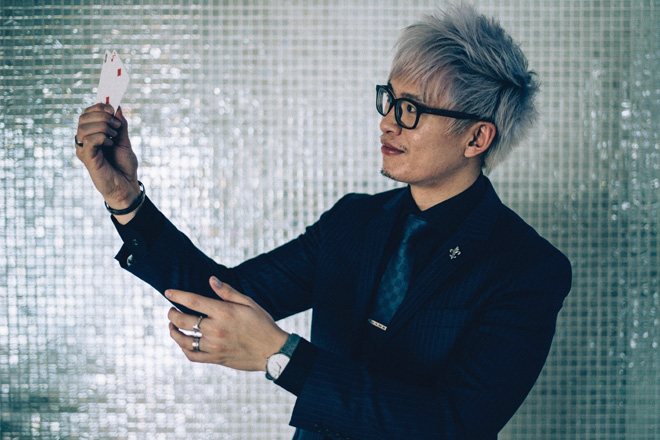All images courtesy of Vinh Giang.
In the early 2010s, Vinh Giang along with three friends launched 52Kards, an online magic school that now enrolls 800,000 students around the world. His early success earned him Australia’s Top Young Entrepreneur award in 2013. In addition to managing his business, Giang is now an international keynote speaker and teaches presentation skills to individuals and groups. Giang will speak at the NBOA Awards Luncheon at the 2020 NBOA Annual Meeting in Orlando, February 23-26.
Net Assets: Independent schools are often told they need to innovate to keep up with a changing educational marketplace. However, culture and traditions at schools can be quite strong—and resistant to change. Do you have any advice for the business and operations leaders of these schools who are often tasked with driving changes to the school business model?
Ving Giang: Let me start by telling you something about magic. You may or may not remember that in the early 2000s there was a magician named Val Valentino. He wore a black mask with white lines on it and was very famous. Then he was paid about $40 million to reveal all the secrets of magic on TV. And as a result of that, the magic industry died, and magicians all hated him.
But in hindsight, we can see that he actually did magicians a favor. He forced magicians to leave the old and create the new — he forced us to innovate. In the last five to eight years, magic has made a strong comeback. And the reason is because magicians no longer do the same tricks — like sawing the woman in half. For over a hundred years we’d been doing the same tricks. It was gross and boring. Then Val Valentino forced us to innovate.
What we magicians did was begin working with people we'd never worked with before. We worked with software engineers, chemical engineers, psychologists, people who did origami. We worked with so many different industries to create new pieces of magic that hadn’t been created before. And from this collaboration have come the new pieces of magic you now see on TV. So the insight there is, in order to solve the problems that we'd never solved before, we needed to collaborate with people we'd never collaborated with before.
Open your mind to collaborating with different people from different industries. Sometimes one thought, one idea can help you completely innovate and revolutionize the way you do things.
All of this is to say: Don't wait until a Val Valentino comes along in your industry. Ask, how can we solve this problem that we've never encountered? And open your mind to collaborating with different people from different industries. Sometimes one thought, one idea can help you completely innovate and revolutionize the way you do things. Collaboration has also been a key to the success of my entrepreneurship. It was a friend who worked as a plumber, actually, who suggested a way for the business I'd launched, 52 Kards, to find customers for a fraction of what it would have cost otherwise.
I hope that hearing stories like this from the world of magic and entrepreneurship inspires people in the realm of education to open up their minds to problems they’ve never solved.

Net Assets: What else might finance and operations leaders learn from a magician? Does your interest in magic overlap with your vision as an entrepreneur and businessperson?
Giang: Magic was my first love because it's all about problem solving. That's what magic is. Magic is just a problem you can't solve. I hate to break it to everybody, but magic isn’t real. The astonishment at a trick is real, the sense of wonder is real, but what the magician does is trickery. Magicians are quite honest about their dishonesty.
What I obsessed about when I first fell in love with magic was watching a trick again and again, in slow motion and in reverse, to try to solve the problem. I did that for years before I fell into entrepreneurship, which is just problem solving but with real rewards. So that’s a connection between the world of magic and business.
The unfortunate truth is that it doesn't matter how passionate you are, how powerful your vision is if you can't communicate that effectively. People won't follow your lead.
One thing that business leaders can learn from magicians is showmanship — another way of saying communication skills. Particularly your “vocal image” — or how you sound to other people — be very conscious of that. The unfortunate truth is that it doesn't matter how passionate you are, how powerful your vision is if you can't communicate that effectively. People won't follow your lead. And your voice is the leader's instrument. Your instrument is your voice. So work on building that skill because it is a skill.
The second thing you can learn from the world of magic is to not get misdirected. What I mean by misdirection is turning a false assumption into a belief. So magicians pretend to take the coin from our left hand and put it in our right hand and make you believe it's in our right hand. But it's not. We created a false assumption. Then you turn that false assumption into a belief and you think the coin disappears.
So what I'm saying here is, don't be misdirected in your career or in your industry. Don't allow false assumptions to turn into beliefs. Much of the time we have false assumptions. I encourage people to look at some of the limiting beliefs they have, for example about what you think is possible for the educational space. That may be based on false assumptions. You might ask, have I been misdirected? Are those assumptions validated, or have I been misled? It’s a really hard exercise to go through, and that's why it's important to have to have a good environment of people who challenge your thoughts and don’t just agree with you.
And the third and final thing I would say is to realize that the impossible, like what magicians present in the form of magic, is not real. It's an illusion that magicians are really good at creating. As someone who has studied deception for the last 15 or 18 years of my life, I can absolutely say that the impossible is an illusion that we create in our own minds.
The greatest illusion you'll ever experience is not one that a magician performs for you. It’s when you tell yourself something cannot be done too often.
I was born into a refugee family, grew up in South Australia, in the rough suburbs of Salisbury North [outside of Adelaide]. I never thought it would be possible to travel the world and speak to Fortune 500 companies. I thought it was impossible, but these limitations were in my mind, just like how limitations will exist in your own minds. You've got to be careful because the greatest illusion you'll ever experience is not one that a magician performs for you. It’s when you tell yourself something cannot be done too often.
When I look back at my life, it's a little bit ridiculous, but I think it has stemmed from what magic instilled in me, that anything really is possible. And here's the thing — even if it's not, I'd rather live my life as if anything is possible, because what's the alternative? I’d rather not live any other way.





